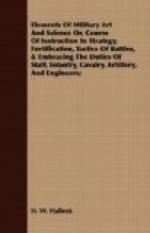In discussing the subject of strategy, certain technical terms are employed, such as theatre of war; theatre of operations; base of operations, or the line from which operations start; objective points, or points to which the operations are directed; line of operations, or the line along which an army moves; key points, or points which it is important for the defensive army to secure; line of defence, or the line which it is important to defend at all hazards: and in general, strategic points, strategic lines, strategic positions, &c. As these terms are very generally used in military books, it may be well to make ourselves thoroughly acquainted with their import. After defining these terms and explaining their meaning and application, it is deemed best to illustrate their use by reference to well-known and striking historical examples.
The theatre of a war embraces not only the territory of the two belligerent powers, but also that of their allies, and of such secondary powers as, through fear or interest, may be drawn into the contest. With maritime nations it also embraces the seas, and sometimes crosses to another continent. Some of the wars between France and England embraced the two hemispheres.
The theatre of operations, however, is of a more limited character, and should not be confounded with the theatre of war. In general, it includes only the territory which an army seeks, on the one hand, to defend, and on the other, to invade. If two or more armies be directed towards the same object, though by different lines, their combined operations are included in the same theatre but if each acts independently of the others, and seeks distinct and separate objects, each must have its own independent theatre of operations.
A war between France and Austria may embrace all Italy and Germany, but the theatre of operations may be limited to only a portion of these countries. Should the Oregon question lead to hostilities between the United States and England, the theatre of war would embrace the greater part of North America and the two oceans, but the theatre of operations would probably be limited to Canada and our northern frontier, with naval descents upon our maritime cities.
The first point to be attended to in a plan of military operation is to select a good base. Many circumstances influence this selection, such as mountains, rivers, roads, forests, cities, fortifications, military depots, means of subsistence, &c. If the frontier of a state contain strong natural or artificial barriers, it may serve not only as a good base for offensive operations, but also as an excellent line of defence against invasion. A single frontier line may, however, be penetrated by the enemy, and in that case a second or third base further in the interior becomes indispensable for a good defence.




